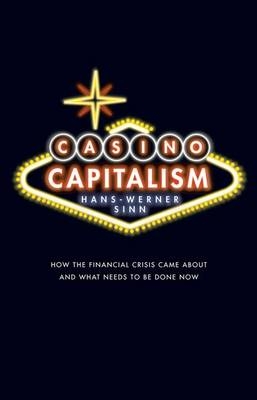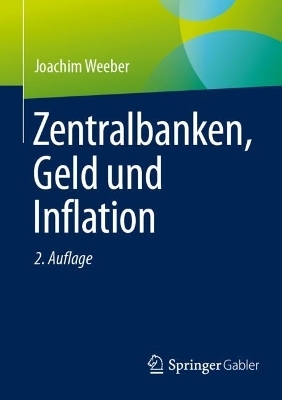
Casino Capitalism
How the Financial Crisis Came About and What Needs to be Done Now
Seiten
2010
Oxford University Press (Verlag)
978-0-19-958827-5 (ISBN)
Oxford University Press (Verlag)
978-0-19-958827-5 (ISBN)
- Titel ist leider vergriffen;
keine Neuauflage - Artikel merken
An English translation of Professor Sinn's bestselling Kasino-Kapitalismus, that provides an account of the origins of the recent financial crisis. The volume examines the causes of the crisis, points out the flaws in the economic rescue packages, and presents a master plan for the reform of financial markets.
In Casino Capitalism Hans-Werner Sinn examines the causes of the banking crisis, points out the flaws in the economic rescue packages, and presents a master plan for the reform of financial markets. Sinn argues that the crisis came about because limited liability induced both Wall Street and Main Street to gamble with real estate properties. He meticulously describes the process of lending to American homeowners and criticizes both the process of
securitizing and selling mortgage claims to the world, as well as the poor job rating agencies did in providing transparency. He argues that the American Dream has ended because the world now realizes that this dream was built on loans that are never likely to be repaid.
Sinn also asserts that the banking crisis has not yet been resolved, because the necessary write-offs of toxic assets have largely been swept under the carpet. Comparing actual worldwide write-offs with those estimated by the IMF estimates, he concludes that substantial parts, if not most, of the true losses have yet to be revealed and that the banking systems of many countries are on the brink of insolvency.
In view of this, he directs sharp criticism at the various economic rescue packages, arguing that the plans assume that banks have a liquidity problem while, in fact, they suffer from a solvency crisis. Sinn points out that the conflict between the goals of rescuing banks in the short term and inducing more prudent behaviour in the long term requires the government to help the banks, but not their shareholders, by becoming a temporary co-owner. In addition, he calls for higher equity
requirements, a worldwide return to more cautious accounting methods, a ban on extremely speculative short selling, and strict regulations on conduits, hedge funds and credit default swaps.
This authoritative account provides an invaluable overview for academics, students, policymakers, politicians, and all those with an interest in the unprecedented 2008 banking crisis.
In Casino Capitalism Hans-Werner Sinn examines the causes of the banking crisis, points out the flaws in the economic rescue packages, and presents a master plan for the reform of financial markets. Sinn argues that the crisis came about because limited liability induced both Wall Street and Main Street to gamble with real estate properties. He meticulously describes the process of lending to American homeowners and criticizes both the process of
securitizing and selling mortgage claims to the world, as well as the poor job rating agencies did in providing transparency. He argues that the American Dream has ended because the world now realizes that this dream was built on loans that are never likely to be repaid.
Sinn also asserts that the banking crisis has not yet been resolved, because the necessary write-offs of toxic assets have largely been swept under the carpet. Comparing actual worldwide write-offs with those estimated by the IMF estimates, he concludes that substantial parts, if not most, of the true losses have yet to be revealed and that the banking systems of many countries are on the brink of insolvency.
In view of this, he directs sharp criticism at the various economic rescue packages, arguing that the plans assume that banks have a liquidity problem while, in fact, they suffer from a solvency crisis. Sinn points out that the conflict between the goals of rescuing banks in the short term and inducing more prudent behaviour in the long term requires the government to help the banks, but not their shareholders, by becoming a temporary co-owner. In addition, he calls for higher equity
requirements, a worldwide return to more cautious accounting methods, a ban on extremely speculative short selling, and strict regulations on conduits, hedge funds and credit default swaps.
This authoritative account provides an invaluable overview for academics, students, policymakers, politicians, and all those with an interest in the unprecedented 2008 banking crisis.
Hans-Werner Sinn is Chair of Economics and Public Finance at the University of Munich and President of the combined Institute for Economic Research and Center for Economic Studies (CES-ifo). He has published numerous scholarly journals and books but is also a leading commentator on contemporary economic affairs in Germany and has published a number of best selling books.
1. The world in crisis ; 2. Life on credit ; 3. Bank failures ; 4. Why Wall Street became a gambling casino ; 5. Main Street also gambled ; 6. Hot potatoes ; 7. Policy failure ; 8. The extent of the damage ; 9. Rescue attempts ; 10. Will the West retain its stability? ; 11. Ways to a better banking system
| Erscheint lt. Verlag | 26.8.2010 |
|---|---|
| Zusatzinfo | 37 Figures, 5 Tables |
| Verlagsort | Oxford |
| Sprache | englisch |
| Maße | 158 x 242 mm |
| Gewicht | 714 g |
| Themenwelt | Sozialwissenschaften ► Politik / Verwaltung ► Staat / Verwaltung |
| Wirtschaft ► Betriebswirtschaft / Management ► Finanzierung | |
| Wirtschaft ► Volkswirtschaftslehre ► Finanzwissenschaft | |
| Wirtschaft ► Volkswirtschaftslehre ► Wirtschaftspolitik | |
| ISBN-10 | 0-19-958827-9 / 0199588279 |
| ISBN-13 | 978-0-19-958827-5 / 9780199588275 |
| Zustand | Neuware |
| Haben Sie eine Frage zum Produkt? |
Mehr entdecken
aus dem Bereich
aus dem Bereich
Organisationen steuern, Strukturen schaffen, Prozesse gestalten
Buch | Softcover (2024)
Rehm Verlag
CHF 53,20
Buch | Softcover (2024)
Springer Fachmedien Wiesbaden GmbH (Verlag)
CHF 41,95


